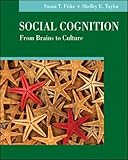Social cognition : from brains to culture / Susan T. Fiske and Shelley E. Taylor.
Material type: TextPublication details: Boston : McGraw-Hill Higher Education, c2008.Edition: 1st edDescription: xii, 540 p. : ill. ; 26 cmISBN:
TextPublication details: Boston : McGraw-Hill Higher Education, c2008.Edition: 1st edDescription: xii, 540 p. : ill. ; 26 cmISBN: - 9780073405520 (alk. paper)
- 0073405523 (alk. paper)
- 302/.12 22
- BF323.S63 F55 2008
| Item type | Current library | Home library | Collection | Shelving location | Call number | Copy number | Status | Date due | Barcode |
|---|---|---|---|---|---|---|---|---|---|
 Libro
Libro
|
Biblioteca Juan Bosch | Biblioteca Juan Bosch | Oficina Leonel Fernández | Colección 6to. Piso | BF323.S63 F55 2008 (Browse shelf(Opens below)) | 1 | Available | 00000111008 |
Includes bibliographical references (p. 397-500) and indexes.
Approaches to studying the social thinker -- Ebb & flow of cognition in psychology & neuroscience -- What is social cognition? -- People are not things -- Cultures matter -- Brains matter -- Basic concepts in social cognition -- Dual modes in social cognition -- Automatic processes -- Controlled processes -- Motivations influence which modes operate -- Models of both automatic and controlled processes -- Attention and encoding : what gets into our heads -- Salience : a property of stimuli in context -- Vividness : an inherent property of stimuli -- Accessibility : a property of categories in our heads -- Direct perception : not just in our heads -- Faces : the focus of social attention -- Representation in memory -- Associative networks organizing memory -- Procedural and declarative memory : what memory does -- Parallel versus serial processing : coordinating memory processes -- Embodied memory -- Interim summary of memory models -- Social memory structures : why social memory matters -- Topics in social cognition : from self to society -- Self -- Mental representations of the self -- Self-regulation -- Motivation and self-regulation -- The self as a reference point -- Causal attribution processes -- What is attribution theory? -- Early contributions to attribution theory -- Processes underlying attribution -- Attributional biases -- Heuristics -- What are heuristics? -- When are heuristics used and when do they lead to wrong answers? -- Judgments over time -- Accuracy and efficiency in social judgment -- Errors and biases as consequential : improving the inference process -- Errors and biases in social inference : perhaps they don't matter? -- Are rapid judgments sometimes better than thoughtfully-considered ones? -- Neuroeconomics : back to the future? -- Cognitive structures of attitudes -- Background -- Cognitive features of two consistency theories -- Lay theories and attitude change -- Functional dimensions of attitudes -- Cognitive processing of attitudes -- Heuristic-systematic model -- Peripheral vs. central routes to persuasion : elaboration likelihood model -- Motivation and opportunity determine attitude processes mode model -- Implicit associations -- Embodied attitudes -- Neural correlates of attitudes -- Stereotyping a central topic in social cognition -- Introduction -- Blatant bias -- Subtle bias -- Effects of bias -- Prejudice : interplay of cogntive and affective biases -- Intergroup cognition and emotion -- Racial prejudice -- Gender prejudice -- Age prejudice -- Sexual prejudice -- From social cognition to affect -- Differentiating among affects, preferences, evaluations, moods, emotions -- Early theories -- Physiological and neuroscience theories of emotion -- Social cognitive foundations of affect -- From affect to social cognition -- Affective influences on cognition -- Individual differences in the affect-cognition interplay -- Affect versus cognition -- Behavior and cognition -- Goal-directed behavior -- When are cognitions and behavior related? -- Using behavior for impression management -- Using behavior to test hypotheses about others.


There are no comments on this title.